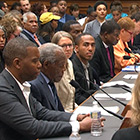
Poverty Doesn’t Make You Racist
According to a recent study, white voters who support anti-racist policies generally have less income than their more racist peers.


According to a recent study, white voters who support anti-racist policies generally have less income than their more racist peers.

How should the struggle for reparations for slavery fit into a broader political strategy for the left?

Boris Johnson could very well become prime minister. The United Kingdom might not survive it.

The idea behind the Laffer curve is a great satire of the hardworking self-image of the American managerial class.

Pauline Kael was one of the great voices of American freedom. The road she opened for critics is simultaneously the most rewarding and the most difficult to follow.

Chan was given a sixteen-month sentence in April for his role in the pro-democracy protests that began in 2014. While he remains imprisoned, his successors have taken to the streets.

The career public defender hopes to join a wave of progressive district attorneys pushing a bold agenda of criminal-legal reform.

The announced parade is the latest right-wing effort to seize the pathos of victimhood from the actually marginalized. Organizers around Boston have shown the greater strength that lies in solidarity.

Right-wing parties, nationalists, populists, and Euroskeptics gained seats in last month’s European elections, especially in Hungary and Poland. The left, in contrast, suffered numerous defeats.

A conversation with the French writer and intellectual profiled in our spring issue.

In our last issue, Michael C. Behrent examined Jean-Claude Michéa’s “subterranean influence on a new generation of anti-capitalist radicals in France.” Here, he talks with Kévin Boucaud-Victoire, a young member of the Michéa-influenced French left.

What do the crimes of a Navy SEAL tell us about U.S. military culture?

Housing is a fundamental necessity, but a growing number of people are unable to afford the cost of living in major cities. To deal with the crisis, we need to roll back the financialization of housing.

In the early twentieth century, immigrant tenant organizers made rent control laws a reality. Today, with new coalitions gathering strength and progressive lawmakers elected in Albany, working-class New Yorkers have a chance to once again strike a blow for housing justice.

Momentum is growing behind an approach to development that can balance the need for more housing with stability and affordability for low-income communities.